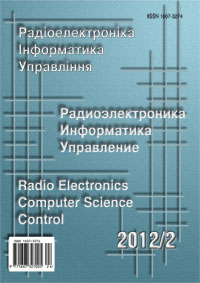ON LINEAR INFINITE SYSTEMS RELATED TO WAVE SCATTERING PROBLEMS FOR PLANAR WAVEGUIDE JUNCTIONS WITH A RECTANGULAR REGION OF INTERACTION
DOI:
https://doi.org/10.15588/1607-3274-2012-2-3Keywords:
infinite systems of linear equations, domainproduct method, waveguide discontinuities.Abstract
Application of the domain-product technique (DPT) to scalar scattering problems in planar waveguide transformers with rectangular coupling cavities (e.g. right-angle bends, T-junctions, cross-junctions and the like) yields one-type matrix-operator equations for both H- and E-plane configurations. This makes it possible to consider the features of the respective mathematical models through the example of a relatively simple representative, namely, an H-plane bend with a dielectric loaded connecting region.Downloads
Published
How to Cite
Issue
Section
License
Copyright (c) 2014 Y.V. Chumachenko, V.P. Chumachenko

This work is licensed under a Creative Commons Attribution-ShareAlike 4.0 International License.
Creative Commons Licensing Notifications in the Copyright Notices
The journal allows the authors to hold the copyright without restrictions and to retain publishing rights without restrictions.
The journal allows readers to read, download, copy, distribute, print, search, or link to the full texts of its articles.
The journal allows to reuse and remixing of its content, in accordance with a Creative Commons license СС BY -SA.
Authors who publish with this journal agree to the following terms:
-
Authors retain copyright and grant the journal right of first publication with the work simultaneously licensed under a Creative Commons Attribution License CC BY-SA that allows others to share the work with an acknowledgement of the work's authorship and initial publication in this journal.
-
Authors are able to enter into separate, additional contractual arrangements for the non-exclusive distribution of the journal's published version of the work (e.g., post it to an institutional repository or publish it in a book), with an acknowledgement of its initial publication in this journal.
-
Authors are permitted and encouraged to post their work online (e.g., in institutional repositories or on their website) as it can lead to productive exchanges, as well as earlier and greater citation of published work.






